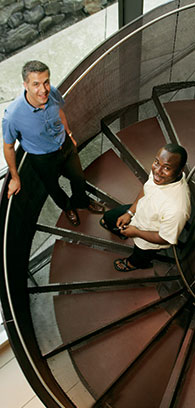by Arthur Kaptainis
Intellectual property: creating a better world

Law professor Richard Gold (left) leads McGill’s Centre for Intellectual Property Policy, which brings together international scholars like PhD student Kent Nnadozie (right) to craft effective IP policies for countries around the globe.
Allen McInnis
Patents, copyrights and trademarks form a familiar trinity in the Western approach to intellectual property. It’s a tradition stretching back to the Norman conquest of England—but one that doesn’t necessarily resonate with all countries and cultures.
“We say that people who copy DVDs in China and Thailand are pirates,” says Richard Gold, Director of McGill’s Centre for Intellectual Property Policy (CIPP). “But if they don’t have a tradition of protecting music and film the way we do, in what sense are they pirates?”
Based in the Faculty of Law, the CIPP brings together international scholars from law, science, music, management and other disciplines to explore new perspectives on intellectual property—perspectives they hope will serve our new era of globalization and furious technological change.
“We’re here to assist policy-makers,” says Gold. “They’re constantly being lobbied, but they lack knowledge about how the system works, about how to put innovation to use. How do we get medicines to the people who need them? Do we buy pharmaceutical company arguments about needing greater patent protection, or is that misleading? When Médecins Sans Frontières says that patents are killing people, is that right, or wrong?”
To understand how governments can best craft and implement effective policies on intellectual property, CIPP researchers pore over reports by international governmental organizations, as well as court decisions, laws and academic articles from around the globe. The researchers then apply this knowledge to real-world problems.
“The difference between doing research and having it sit on the shelf, and doing research that actually does something, is training people,” says Gold. “We want to provide policy-makers with the tools they need to make better decisions. We’re not telling them what to do, we’re saying, ‘If you’re trying to do this, try changing these policies.…'”
“We’re making the link between the theoretical aspects of IP rights,” adds Kent Nnadozie, a PhD candidate in civil law originally from Nigeria, “and the practical issues of how it affects people on the ground.”
As a director of Kenya’s Southern Environmental and Agricultural Policy Research Institute (an initiative of the International Centre for Insect Physiology and Ecology), Nnadozie knows first-hand the acute need for this knowledge. Tick-born diseases, for example, plague 800 million cattle yearly across the globe and impede the developing economy of countries like Kenya. Scientists there have discovered an effective tick repellent, but the lack of patent protection and adequate infrastructure to manage intellectual property is preventing its commercial release.
“I came to McGill,” says Nnadozie, “so I could put my experiences and knowledge into a conceptual framework that will better equip me to help innovation, to generate development, to improve people’s lives.”
While continuing to advise policy-makers—CIPP researchers helped the Organisation for Economic Co-operation and Development create guidelines for the licensing of genetic inventions—the Centre is now focused on expanding its training mission. It hopes to add shorter certificate programs for scientists, engineers, managers and bureaucrats from developing countries and remote parts of Canada who might not be able to commit to a three-year graduate program.
“There is a local capacity in developing countries, there are bright people in these places. You have to find researchers interested in making a difference and help them,” says Gold. Progress on the international stage can be slow, but he is optimistic about the CIPP’s long-term impact.
“You don’t aim for a big change in two years,” Gold adds, “but you hope that in 10 years people can take advantage of what you have given them.”
The Centre for Intellectual Property Policy receives funding from the Social Sciences and Humanities Research Council of Canada, the Canadian Institutes of Health Research and the Networks of Centres of Excellence.
